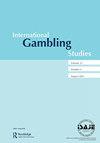Is the economic model of gambling dependent on problem gambling? Evidence from an online survey of regular sports bettors in Britain
IF 2.5
3区 心理学
Q2 SUBSTANCE ABUSE
引用次数: 3
Abstract
ABSTRACT Understanding how the gambling industry generates revenue is of paramount importance. Questions about whether higher volumes of expenditure are concentrated among a small proportion of gamblers, and how this varies by problematic gambling status, underpin policy debate about consumer protection. Analyzing data from two timepoints (T0; T2) from a British longitudinal study of regular sports bettors, we explored both for total (gross) spend and gross spend on individual activities: (a) the concentration of self-reported spend on gambling among individuals; and (b) the extent to which spending was disproportionately generated by those with elevated Problem Gambling Severity Index (PGSI) scores. Results showed that gross gambling expenditure was unequal (GINI-coefficient >0.70 for most activities). At both timepoints, those with a PGSI score of 3+ had an elevated share of spending: at T2, 14.1% of PGSI 3+ gamblers accounted for 43.5% of gross gambling spend. There were differences by activity: lotteries displayed less reliance on those with a PGSI score of 3+ whereas this group contributed over 80% of gross spend on online casinos. Policy attention should focus on reframing the underlying economic model on which some gambling activities are predicated, creating more equal patterns of consumption and less reliance on those harmed.赌博的经济模式是否依赖于问题赌博?一项针对英国普通体育投注者的在线调查证据
摘要了解博彩业如何创收至关重要。关于更高的支出量是否集中在一小部分赌徒身上,以及这一比例如何因有问题的赌博状况而变化的问题,是关于消费者保护的政策辩论的基础。通过分析英国一项对普通体育博彩者的纵向研究中两个时间点(T0;T2)的数据,我们探讨了个人活动的总(总)支出和总支出:(a)个人自我报告的赌博支出集中度;以及(b)那些问题赌博严重程度指数(PGSI)得分较高的人在多大程度上不成比例地产生了支出。结果显示,赌博总支出不平等(大多数活动的基尼系数>0.70)。在这两个时间点,PGSI得分为3+的人的支出份额都有所增加:在T2,14.1%的PGSI 3+赌徒占总赌博支出的43.5%。活动存在差异:彩票对PGSI得分为3+的人的依赖程度较低,而这一群体在在线赌场的总支出中所占比例超过80%。政策关注应该集中在重新构建一些赌博活动所依据的基本经济模式上,创造更平等的消费模式,减少对受害者的依赖。
本文章由计算机程序翻译,如有差异,请以英文原文为准。
求助全文
约1分钟内获得全文
求助全文

 求助内容:
求助内容: 应助结果提醒方式:
应助结果提醒方式:


